All Systems Are Breaking!

The distance between nature and humanity is increasing, with most of humanity living in a separate existence to nature. We seem to have forgotten that we are a part of nature but have gradually become more and more distant from it. We have a mutual relationship with it. We are nature, and nature is us..

Introduction.
This article explores where and how we get information. It also looks at how information affects people. Information originates from various sources, but this article mainly refers to information from the news media and does not separate the mainstream media from other media organizations, although it weighs heavily on the mainstream media.
Things started off simple...
Early humans lived in nature; everything they did was a part of nature. Influences came from people sharing their experiences of living in nature. Information shared between people was first-hand and passed from person to person. Various tribes lived in many parts of the world, but they were unaware of each other's existence. There were many "first contact" encounters between various peoples in local regions; if these encounters were friendly, there was some information sharing. In general, there was no communication or information exchange between remote groups of people.
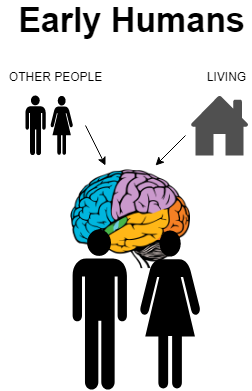
Advancements in communication technologies.
Every advance in communication technology has increased the exchange of information between people. Today, in the digital age, news from around the world travels rapidly around the world, and the range of information available to individuals has grown exponentially.
In stark contrast to early humans, many people today are continually preoccupied with obtaining information about celebrities and influencers. The need to be informed in this way has become a part of many people's daily rituals and pass time. All this information is available to people in the digital age. An immense amount of information is available 24/7/365 from almost anywhere in the world. What a breath of fresh air certain apps have been?? The overuse of social media services has led to mental health issues such as depression and anxiety. Related article: Taking a week's break from social media can be a big boost for your mental health. What a revelation! Does it really take "researchers" to make people realize this? Instead of just wanting a "boost" for one week, What if people wanted to be completely cured of online mental health issues? Maybe completely staying away from social media would achieve this...
In actuality, when social media is utilized to provide information to help and support people, that's positive; that's a good thing, with the caveat that the technology available today is not the answer for long-term mental health issues. There are many other factors causing mental health issues in today's world; social media is just one of them.
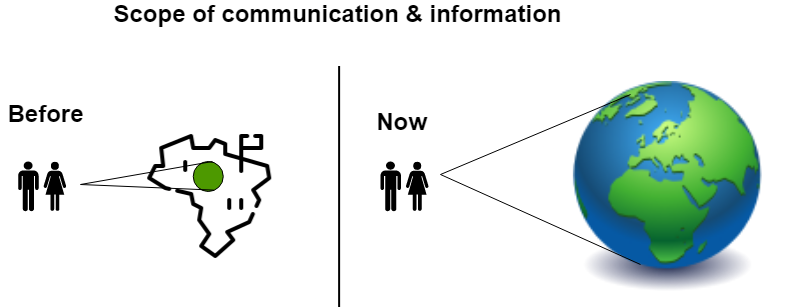
The modern day...now.
People need information to maneuver their way through world systems; in most parts of the world, it has become a necessity to obtain information every day. In comparison, early humans did not have the systems we use today; their information came from a natural connection to the land, people, and their environment. The way early humans lived was consistent with other species, but humans gradually moved away from being consistent with other species on the planet.
In the systems we live in today, we need information, but the way various types of media outlets present information can be a problem. The way the media present information has led to a greater influence on people, and this fact shapes people's attitudes. A good example is that some history books are written using information from a particular person's perspective and not a consensus perspective. If the information is not factual and it makes its way into various types of media, for example, books, movies, radio, and similar, then generations of people form an incorrect account of history, and this can lead to people expressing views and building up attitudes based on inaccurate information.
The diagram below shows the various sources of information that people consume. Today, people are preoccupied with acquiring information, no matter how relevant it is to everyday life. Compared to the diagram on early human information, we can see why today's information can have a major impact on the way people think; people's thoughts are decreasingly their own.
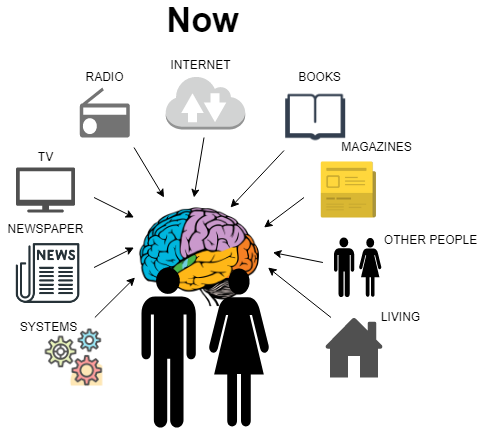
Is the information true or false?
Obtaining information is not the issue. Issues arise when information becomes knowledge because of inaccuracies. How can people guarantee that the information provided is factual and true? Information becomes knowledge regardless of whether it is true or false. When people think or act with incorrect information, it is a huge problem. Web3, if implemented correctly using a reliable decentralized network, will help with many of the issues with news media and information distribution, however to verify the integrity of content globally is challenging, and the idea of using blockchain technology in conjunction with Artificial Intelligence (AI) may be a possible solution.
Definition of media.
The means of communication, such as radio and television, newspapers, magazines, and the internet, reach or influence people widely.
Influencing thoughts...
Increasingly, information from the mass media has also been linked to mind control and brainwashing. Information from various sources can significantly influence people, and this can lead to incorrect perceptions of other people, groups, cultures, and other things. These thoughts and views are largely fueled by a constant bombardment of information from various media; a high percentage of the information is not independently validated.
A fearful society is a controllable society.
Everyone knows there are plenty of bad news stories, but today the media present almost everything as an issue to shock and inflame people's thoughts, When people hear the same opinionated news stories over and over again from several different media sources on a daily basis, this affects their thoughts, makes them overly judgmental of everyone and everything around them, and this is not good for society.
"Fear is the foundation of most governments." - John Adams - 2nd president of the United States (1735-1826)
Influential information directed at the masses spurs people to become extremely judgmental about everything, including current events, countries, groups, and individuals. The digital age has only exacerbated the problem of harmful behavior. Inflicting emotional harm on social media is a big problem; it's done with intention and without any consideration of other people's feelings. Check out our article on groups and the herd mentality, which thrives physically and digitally.
How information makes its way into people's thoughts.
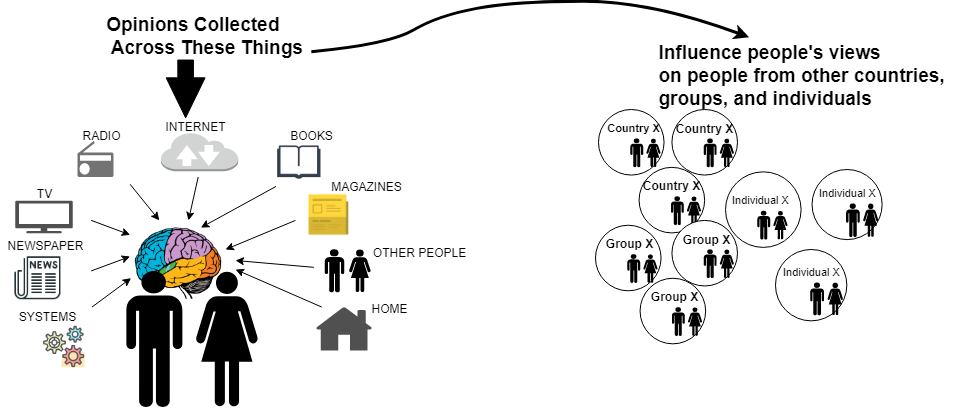
What's wrong with current Information & Media systems?
News Media
Today's news is presented in an opinionated format, and this can influence people in a negative way. There was a time when the news was released without the opinions of a journalist, without the government narrative, and without the opinion of any celebrity. In the past, news was directly related to the information of the people associated with the story, without any outside perspective. The current generation is feverishly excited about what other celebrities, influencers, and other members of the public think about current events. The media has fed off of this trend to increase their popularity and ratings. Related article: More people are avoiding the news, and trusting it less, report says.
Obtaining accurate information.
In the present day, the information on the big news headlines is essentially the same across various sources. When all media outlets are reporting the same headline news, we can mostly assume the news event to be true; when it comes to more detailed information about the news event, the information provided has several conflicting claims.
The Internet and New Media have provided us with a great deal of information in various formats: TV, Radio, Newspapers, Magazines, white papers, and so forth. However, different news and information articles have several conflicting claims, and there is no single point of fact. People share their version of the truth with other people; the information is filtered and diluted, and in the process, the details become inaccurate. Just to add to the challenge of obtaining genuine information, there is misinformation, fake news, disinformation, and propaganda.
News outlets want to be the first to announce news stories, and this drives them to report news even if the information is partial and fragmentary. News outlets want to compete to be the first to announce news events because it increases their visibility, increasing their audience and ratings, which in turn increases profits.
Who owns the mainstream media?
The story is similar in most major countries around the world.
- Concentration of media ownership.
- Four men own Britain’s news media. Is that a problem for democracy?.
- Index of US Mainstream Media Ownership
- Extra level of power’: billionaires who have bought up the media (exclude one of them, for now.)
- The 10 most powerful African media moguls.
We all know there is bad news, but many news media sources like to outstretch and latch onto the theme of fear to retain their audience. During the 2020 pandemic, people were subjected to the pandemic statistics on a daily basis, followed by daily government briefings, so they decided to report them on a daily basis. At the same time, pollution-related fatalities are also global and have been occurring every day for decades now. Why aren't we seeing daily statistics on pollution levels around the world?? If 7 million people die of air pollution each year, people should be informed using pandemic-style statistics. If you have read our article on The Environment then you will know why.
Obtaining accurate information remains a fundamental issue, whether it's historical or current events. How many internet searches do individuals perform before finding the information they are searching for? After finding the information, is there a 100% guarantee that it is factual? The answer to this question depends on what is being searched for. For example, if the search is for scientific or mathematical information, there is a significantly high probability that the information will be accurate on the first search. Well-Established scientific and mathematical information is validated. Otherwise, most other searches need to be cross-referenced utilizing several sources before being considered valid information.
Competition based, not quality based.
Information and Media organizations are extremely competitive and try to outdo each other; battling to bring the information to people first and being the first to get the information out bumps up their popularity. The more shocking the news headlines, the more viewers and readers are drawn in. More viewers or readers mean more profits. The competition has grown so much that 24/7 news channels provide people with reports on almost anything.
Just give me the facts...
There was a time when news was reported without any outside opinions or analysis. In contrast, today's people are bombarded with news in various formats. 24 hour News TV channels bringing you every piece of information, regardless of its significance, and then repeating it every hour, broadcasting 24 hours a day, all that time has to be filled with something or other. A large portion of that "something or other" is usually a large amount of interpreted and opinionated analysis of the current news reports. Other than things that affect people's immediate daily lives, very little news media information is useful to any individual. Related articles: Reporters Putting Their Own Spin on News Events (Nov 1993), Why the News Is Not the Truth (Jun 1995), Majority of Australians believe journalists should stick to news rather than opinion on social media. Issues around the news media are not new, and the old article links prove this. What's even more disheartening is that nothing has changed. The same issues are still being discussed.
There was a time when the TV news was just read verbatim. There were no celebrity or external views, and every news story was not constantly analyzed. The public's opinion was generally their own; today we have 24-hour opinionated news. Opinions from as many people as possible, even on what many may consider insignificant information. The news media today makes even the most insignificant things appear to be major issues. If people are blissfully unaware that a particular thing was ever an issue, they are led to believe it's now an issue. All this opinionated news and making the insignificant seem significant plants the wrong thoughts in people's minds. It's no wonder people are saying these things., More people are avoiding the news and trusting it less. This link is intentionally used twice. The report is US-centric, but these types of sentiments are shared in many countries.
Impartiality is the key.
News media information can be presented without a negative impact on the public. If the news media is provided with an impartial approach, it can be considered a good public service. Related article: Impartiality is still key for news audiences. Here’s how to rethink it for the digital age
There is a bombardment of news information at people from various formats, including TV, radio, newspapers, and magazines, and everything is replicated in digital form. When this barrage of information directed at people gets too much, it's called "Information Overload". People receiving more information than they can manage can lead to numerous health problems, starting with stress, and prolonged stress is a serious mental health issue. Prolonged stress can lead to other health issues.
Contrary to how "The System" wants to perceive people, people are physiological, not mechanical, and not computerized.
Information shaping
The way the news media operate has a big impact on society. Media outlets are not only presenting the news, but regardless of whether the news is positive or negative, it is presented in a way that influences the public in one direction or another. An influenced public makes judgments and assumptions about other people and things. Taking into account that 99% of news is bad news and that the public's judgments and opinions are mostly negative, add to this the variations of particular news stories across the media, and the outcome is a fearful and misinformed public. A fearful and misinformed public does not make for a healthy society.
Most of the public forms judgments and options based only on the news headlines without going into depth with all the information. Just the news headline is enough for people to form firm opinions and make assumptions without knowing all the facts. News media organizations understand that shocking news headlines bolster sales of newspapers and increase viewing and ratings figures. Simply put, the news media set up the structure to influence what the public's narrative should be on particular issues. Related article: Agenda-setting_theory
The general public politicians.
Many people in the public have the inner politician in them just waiting for that opportunity to let it all out, desperate to make their views and opinions heard and, in many instances, trying to impose them on other people. Opposing views among the public can cause tension. One person or group thinking they are armed with so much more information on particular issues than the other, thinking they are smarter than the other, when in actual fact, as discussed earlier, the information they hold could be inaccurate, but that doesn't prevent them from giving you their version of righteousness and trying to encourage a debate. One polite quote comes to mind: "Beam me up, Scotty!" The government makes all the rules and regulations, and opposing groups in the public end up with all the tensions?? Check our article on Government Systems
The system is broken. Various news media sources give conflicting and opinionated accounts of the news. Various media outlets around the world provide news targeting a particular political spectrum. This creates contention between people and groups of individuals who all believe their own version of the facts based on where they place themselves within the political spectrum.
and now, finally...
In the past, news of unfortunate events around the world was not far-reaching. The speed of today's news means that people are able to help those affected by unfortunate events. This is one way the news media is actively helping humanity.
We're not the only ones saying it - check these links.
Next Time: Internet Systems...
The emotions you feel when looking at these pictures are what a mind without human-created systems feels like. As nature intended.

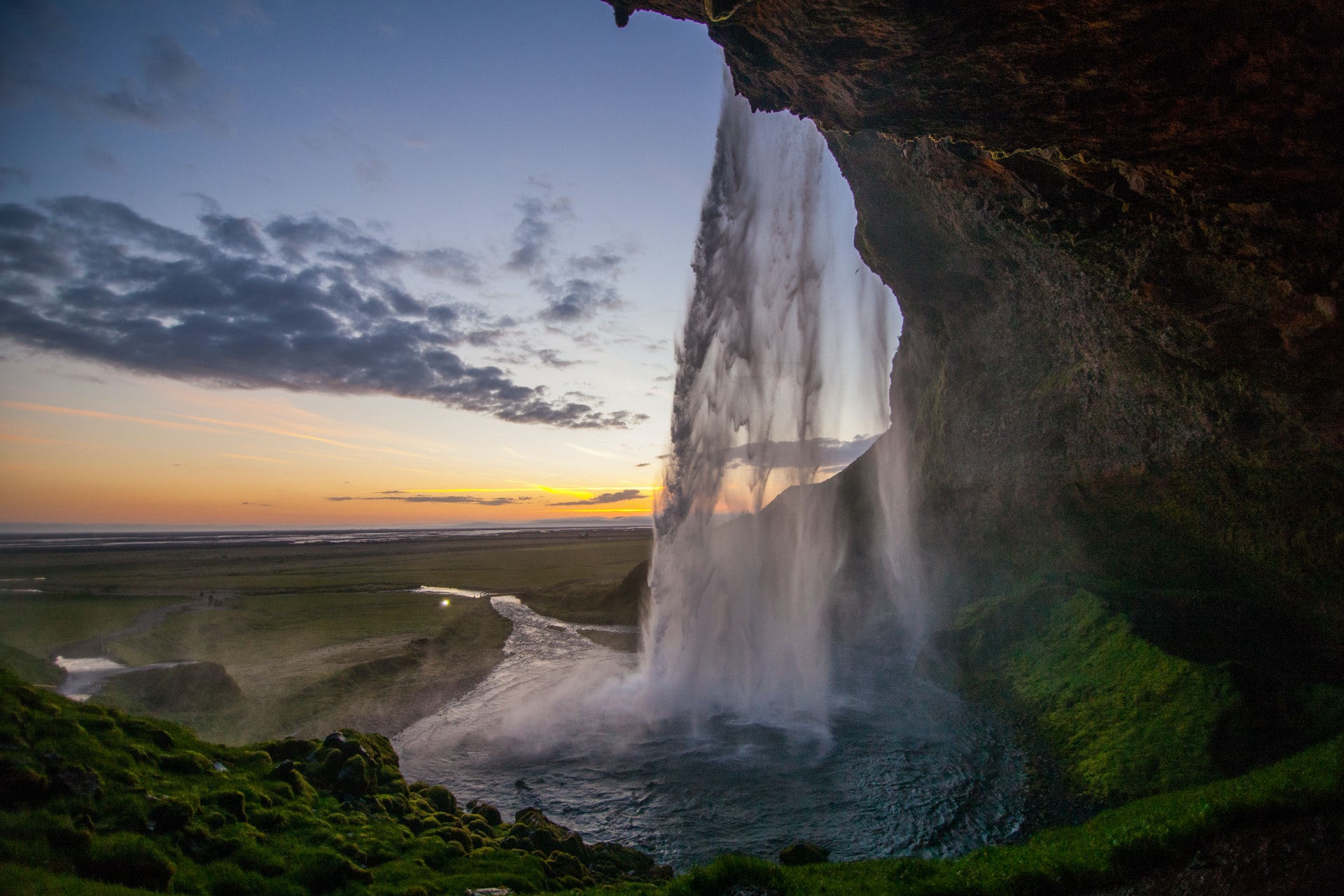
Main Page: Systems.
© Lightnetics 2024